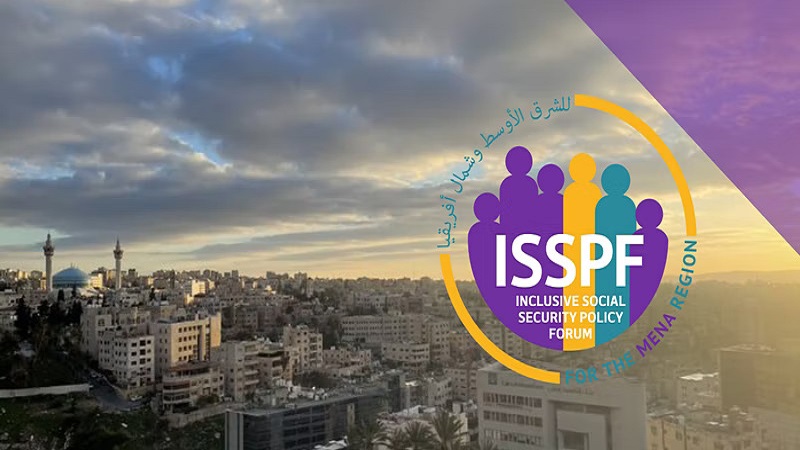Inclusive social security and the social contract in the MENA region
Tue, 31 May 2022 12:00 - 14:00 British Summer Time (UTC+1)
Register here.
Join the Inclusive Social Security Policy Forum (ISSPF) in the MENA region for a webinar on inclusive social security.
About this event
A strong social contract – the implicit agreement between the people and government that defines the rights and duties of each – is at the heart of any country’s chances of achieving prosperity and stability. In many countries in the Middle East and North Africa (MENA) region, social contracts are fragile because trust in government is low.
This webinar – Inclusive social security and the social contract – can it build trust in the MENA region? – features discussions from the region on how social security can enhance the social contract to overcome instability, where it prevails, and build trust between the state and its people.
Our panel discussion, followed by a Q&A, will explore the consequences of weak social contracts in the MENA region, the evidence for how inclusive, universal social security can build trust between governments and people – and how to finance it – as well as the negative impact of poverty targeting approaches on the social contract.
Register via the link below to participate in the webinar online. The event will be conducted in English and Arabic.
We are pleased to welcome experts with a wealth of knowledge to our panel:
Give the gift of hope
We practice what we preach:
accurate, fearless journalism. But we can't do it alone.
- On the ground in Gaza, Syria, Israel, Egypt, Pakistan, and more
- Our program trained more than 100 journalists
- Calling out fake news and reporting real facts
- On the ground in Gaza, Syria, Israel, Egypt, Pakistan, and more
- Our program trained more than 100 journalists
- Calling out fake news and reporting real facts
Join us.
Support The Media Line. Save democracy.
Daisy Sibun, social policy officer, Development Pathways
Daisy will present highlights from her new paper for the ISSPF on the social contract. She is a Social Policy Officer at Development Pathways, with a particular interest in citizenship, crises and the nation-building role of inclusive social security. Her background is in political science and development studies. Her publications include “Assessing the scope and adequacy of social protection responses to the COVID-19 crisis in the MENA region – a focus on tax-financed income transfers” (Sibun, 2021) and “What has the COVID-19 crisis taught us about social protection?” (Kidd and Sibun, 2020).
Dr Markus Loewe, research team leader, the German Development Institute (DIE)
Markus is research team leader at the German Development Institute (DIE), Bonn, where he has been working since 1999. He studied development economics and political science in Tübingen, Erlangen and Damascus and got his PhD from Heidelberg University for a thesis on micro-insurance. His research covers social protection, poverty reduction, industrial policies, micro, small and medium enterprise development and the concept of the social contract. His regional focus is the Middle East and North Africa. His more recent publications include “Framing the emergence of new social contracts in Middle East and North African countries” (special issue of World Development, 2021, ed.), “Handbook of social protection systems” (Edward Elgar, forthcoming 2021, ed. with Esther Schüring) and “Social protection in the MENA countries: prospects for a new social contract?” (special issue of International Social Security Review, 2018, ed. with Rana Jawad).
Dr Maria del Mar Logrono-Narbona, senior advisor, Arab Renaissance for Democracy and Development
Maria is an independent consultant and analyst. She has served as Assistant Professor at Appalachian State University (North Carolina) and Florida International University (Miami). During her years in academia, she was the Principal Investigator of two Social Science Research Council (SSRC- Carnegie Endowment) grants under their “Islam in World Contexts” program. Her academic work has explored questions of political and social identity among Arab migrants, along with socioeconomic, political, and gender analysis in the MENA region and the Global South. She is the author of specialized articles and reports, as well as co-editor of Crescent over Another Horizon: Islam and Latin America, the Caribbean and Latino USA (Texas University Press, 2015).
Hafawa Rebhi, Policy Analyst, Tunisian Observatory of Economy (TOE)
Before joining the TOE team, Hafawa worked for 10 years as a journalist with a focus on social and economic issues.
About the organisers
The Inclusive Social Security Policy Forum (ISSPF), funded by the Ford Foundation, is focused on building knowledge and capacity on inclusive social security in the MENA region.
With its focus on applied policy solutions in social security, the ISSPF supports broader efforts in the region aimed at opening dialogue around the linkages between social policies and the overarching objectives of peace, security, economic development and democracy.
Across the MENA region, social insurance schemes tend to provide support solely to those in the formal economy, while the rest of the population is only offered poor quality programmes for “the poor”. There is a dire need to shift the narrative on delivering social protection in the region by moving away from the prevailing old-fashioned poor relief model and towards a modern, inclusive, social security model.
Development Pathways, together with the Centre for Social Sciences Research & Action in Lebanon, the Arab Renaissance for Democracy and Development in Jordan and l’Observatoire Tunisien de l’Economie in Tunisia, are the leading partners in the Forum.
Date and time: 12:00-14:00 UK time, 31 May 2022.



